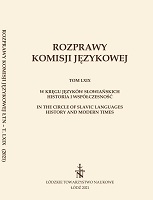ZAGADNIENIE MINIMUM JĘZYKOZNAWCZEGO W KOMPETENCJI ZAWODOWEJ LOGOPEDY
THE PROBLEM OF LINGUISTIC MINIMUM IN THE PROFESSIONAL COMPETENCE OF A SPEECH THERAPIST
Author(s): Edward ŁuczyńskiSubject(s): Applied Linguistics, Phonetics / Phonology, Psycholinguistics, Cognitive linguistics
Published by: Łódzkie Towarzystwo Naukowe
Keywords: speech therapy; speech therapist profession; professional competence; linguistics;
Summary/Abstract: There is conviction in the speech therapy community that linguistic knowledge in the field of phonetics is sufficient to practice as a speech therapist. This is due to the fact that speech therapy practice is most often associated with improving the pronunciation of people (usually children) with speech disorders. However, knowledge limited to the phonetic structure of language gives a distorted picture of it, limited to the lowest linguistic level. Units of phonetic level, such as sounds and phonemes, are merely the building blocks of higher levels of the language structure with such units as words, mor - phemes, syntactic structures and texts. Therefore, the minimum linguistic knowledge of a speech therapist should include – apart from phonetics and phonology – basic information in the field of lexicology and grammar, as well as selected issues from other areas of linguistics.
Journal: Rozprawy Komisji Językowej
- Issue Year: 2021
- Issue No: 69
- Page Range: 79-87
- Page Count: 9
- Language: Polish

